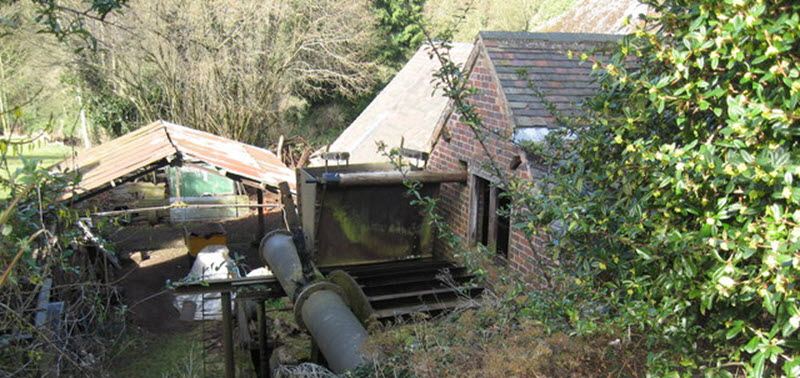Contents
Churchill Frorge Mill is one of the last intact water-powered forge mills in Great Britain. Located in Worcestershire, it is a prime example of the industrial heritage of the West Midlands.
The mill was chiefly used to produce agricultural tools with an edge, e.g. spades, shovels, hoes, forks, and cultivator blades. In addition to this, the salt workings in nearby Droitwich ordered their bespoke shovels (known as skippets) from the Churchill Forge Mill, the Stourbridge glass industry relied on the forge mill to obtain pouring ladies, and several of the Black Country metal refineries bought tools from the Churchill mill.
The mill is now maintained by the Churchill Forge Trust Limited who keeps both the building and the equipment in working order. The mill is sometimes open to the public who can visit and see it doing its work.

Location
The mill is located in Churchill, a village in the Wyre Forest District of Worcestershire in the West Midland region of England. Churchill is not far from the town Kidderminster.
Configuration
The current main wheel driving the forge machinery is 17 feet in diameter and 5 feet 3 inches wide. It is mounted on an 18 foot long iron axle. This axle carries two of the original flywheels (which used to be trip hammers).
The new spur wheel
A fairly recent addition is the spur wheel. This spur wheel meshes with a smaller one which powers a flat belt to drive hammers, presses, etc.
A crank on the axle operates a crocodile shear that can be used to cut mild steel.
The older wheel
The mill also has an older wheel (from the 1800s) which is 17 feet in diameter but only 2 feet 3 inches wide and equipped with an oaken axle. Once upon a time, this wheel powered the furnace blower for the forge and two wet grindstones.
History
The Churchill Forge Mill is powered by the Ganlow Brook. As early as the Medieval era, this brook was dammed to create a pond, and water from the pond was led through a sluice to power the mill.
We do not know for how long a mill has been present here, but the mill is mentioned in a charter from 1238. This charter tells us that Robert de Hurcote granted Hugh Drugel “the whole land of Churchill, with the advowson of the church and the mill” when Drugel was married to Hurcote’s sister Margery. Hurcote had paid 20 shillings to the Lord of Hagley for the settlement and a yearly rent to the Prior of Dudley for the mill.
The mill is then mentioned in various other texts throughout the centuries as it goes through ownerhsip changes. Toward the late 16th century, it is referred to as a blade mill with a pool.
The Bache family
The Bache family has owned the mill since the late 1700s. This family has very deep roots not just in area but also in the mill running business. William Bache (1743-1817) ran the Stakenbridge Forge, and his son combined business and pleasure by marrying the Churchill Forge Mill’s owner’s daughter in 1796.
During the 19th century, the Baches modernised and developed the brick mill.
The Churchill Forge Mill was closed down during World War I due to a lack of workers. After the war, Benjamin Bache – who had been working in a forge in Stourbridge – returned to the family mill and reopened it together with his son Claude. Together, they formed “Benjamin Bache and Son, Spade, Blade, Shovel and Ladle Works”.
Claude kept the business running even after his father’s death, until he finally retired in 1969.
In 1979, a preservation trust was formed – and it included several members of the Banche family. In 1981, this trust became the Churchill Forge Trust Limited. Since then, the trust has maintained the building, kept the machinery in working order and welcomed visitors interested in seeing the mill operate.